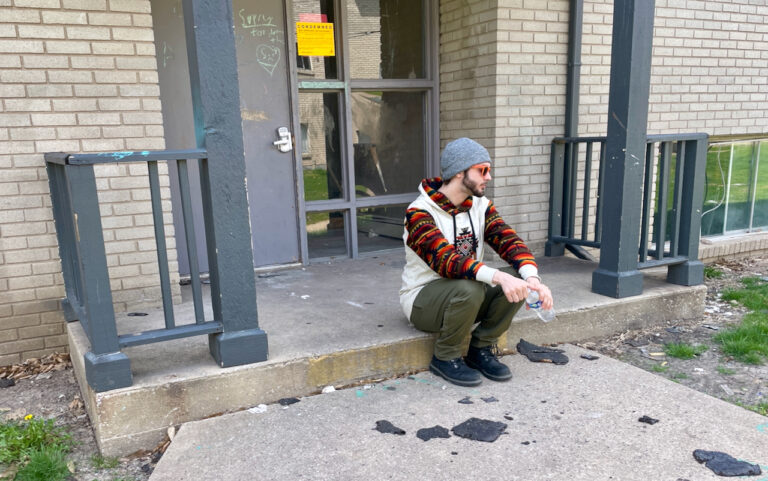Dustin Schingl’s ceiling collapsed two months after he moved into Champaign Park Apartments.
And his living conditions just kept getting worse.
“It was a nightmare honestly,” Schingl said. “It was one of the most stressful places I’ve lived. I felt like my home was insecure. I lost a big sense of security.”
The city of Champaign condemned 393 of the Champaign Park apartments last winter. Schingl said the problem runs much deeper – and it has affected his health.
Between his move-in in August 2021 and move-out in March 2023, Schingl said he dealt with mold, cockroaches, electrical issues and more.
These issues led him to experience rashes, migraines and stomach ulcers due to the stress of living there, he said.
Schingl’s apartment wasn’t even one of those condemned by the city last winter.
“It’s a feeling of feeling helpless,” he said. “It’s a feeling of feeling trapped. And these people, they don’t have a voice.
“Nobody’s listening to them.”
Housing impacts health

Many of the Champaign Park apartments fit the definition of substandard housing spelled out by federal regulations: dilapidated and without working plumbing or heat.
Housing can impact people’s health in many ways, said Giselle Routhier, a research assistant professor at New York University’s Department of Population Health.
“There’s a lot of added stress for someone who’s living in substandard housing,” she said, “whether it’s going through a landlord to try to get repairs done, scheduling those repairs, making sure they’re done in a timely manner.
“If you’re living in a housing unit that has a lot of peeling paint, or has mold, or has an infestation of pests, then those environmental factors actually do have an impact on health.”
Poor housing conditions and physical hazards – like mold or asbestos – can make people sick, according to the U.S. Department of Health and Human Services.
Issues with housing conditions also disproportionately impact children, older adults, people with physical disabilities and low-income individuals, according to the department.
What happened last winter?
Out of the units that Champaign initially condemned in November and December, 357 are still condemned, said Tim Spear, Champaign’s code compliance manager.
A big part of the problem was a lack of proper boiler maintenance, Spear said.
He said there wasn’t an active property manager around the time that the temperatures dropped.
“There was a gap where there was nobody doing anything for the tenants in the property,” Spear said. “There was nobody there when things started going wrong to make sure they got fixed.
“So things started to cascade from there. Like they were good, and things got bad, and there was nobody to catch things before they got worse.”
The complex is still repairing its remaining condemned units, he said. He hasn’t received any updates since March 24.
“We kind of expected that they would want to get things lifted quicker,” Spear said. “But it seems as if after the last tenant moved out of hotels, that was their most pressing concern.”
Champaign Park and the city of Champaign will meet in court again June 6 to evaluate whether the complex has completed its repairs, said Nancy Rabel, Champaign’s assistant city attorney.
As of April 14, the complex still owed the city $145,000 for the hotel fees the city paid to house residents displaced by the condemnations, Rabel said.
It was difficult to work with the property management group because it changed hands in February 2022, she said.
“We have had difficulty with that, and then the ownership did get involved as this has gone on, and as when they got legal counsel, working with them has gotten better,” Rabel said. “But in the beginning, it was very difficult.”
Representatives from Champaign Park Apartments did not respond to multiple requests for comment.
Landlords must fix issues within two weeks

In the less than two years he lived at Champaign Park, Schingl said there were five different property managers, which often complicated his requests for the complex to fix the issues in his apartment.
“With them continuously … switching property managers, they get to conveniently live behind the excuse of, ‘Oh, we just took over,’” Schingl said.
Schingl said he had to wait weeks for them to look at his collapsed ceiling, but he said some issues weren’t addressed.
“The mold in the bathroom was such a simple fix,” he said. “All they had to do was just scrape out the old caulking and replace it so that the mold wasn’t spreading.
“They didn’t treat the actual mold and the ceiling. They just covered it right back up. They didn’t fix the problem. They didn’t do anything.”
In Illinois, landlords have 14 days to repair problems in tenants’ units after receiving written notice, according to iProperty Management.
If these repairs aren’t made in a timely fashion, tenants can withhold rent, take legal action, and report the issue to public officials.
Schingl said he sometimes had to wait months for issues in his unit to be fixed, like when the light in his kitchen began dangling from his ceiling.
“I didn’t have light in my apartment for six months,” he said. “They fixed it after four or five [months], and then for another month or so after that, there was still no power in my kitchen.”
Schingl moved out of the complex last month. He now lives in Urbana but said he’s still coping with the trauma of living at Champaign Park.
“I didn’t realize how bad Champaign Park was,” he said. “I realized how bad it was, but the aftermath of dealing with it, there’s a lot of things you still gotta shake off from that.”
Schingl said he’s relieved to be out of the complex.
“I feel comfortable in my house now,” he said. “I feel safe. I feel like it’s a home.
“And I feel like I can more actively deal with all the other things in my life that need my attention.”

